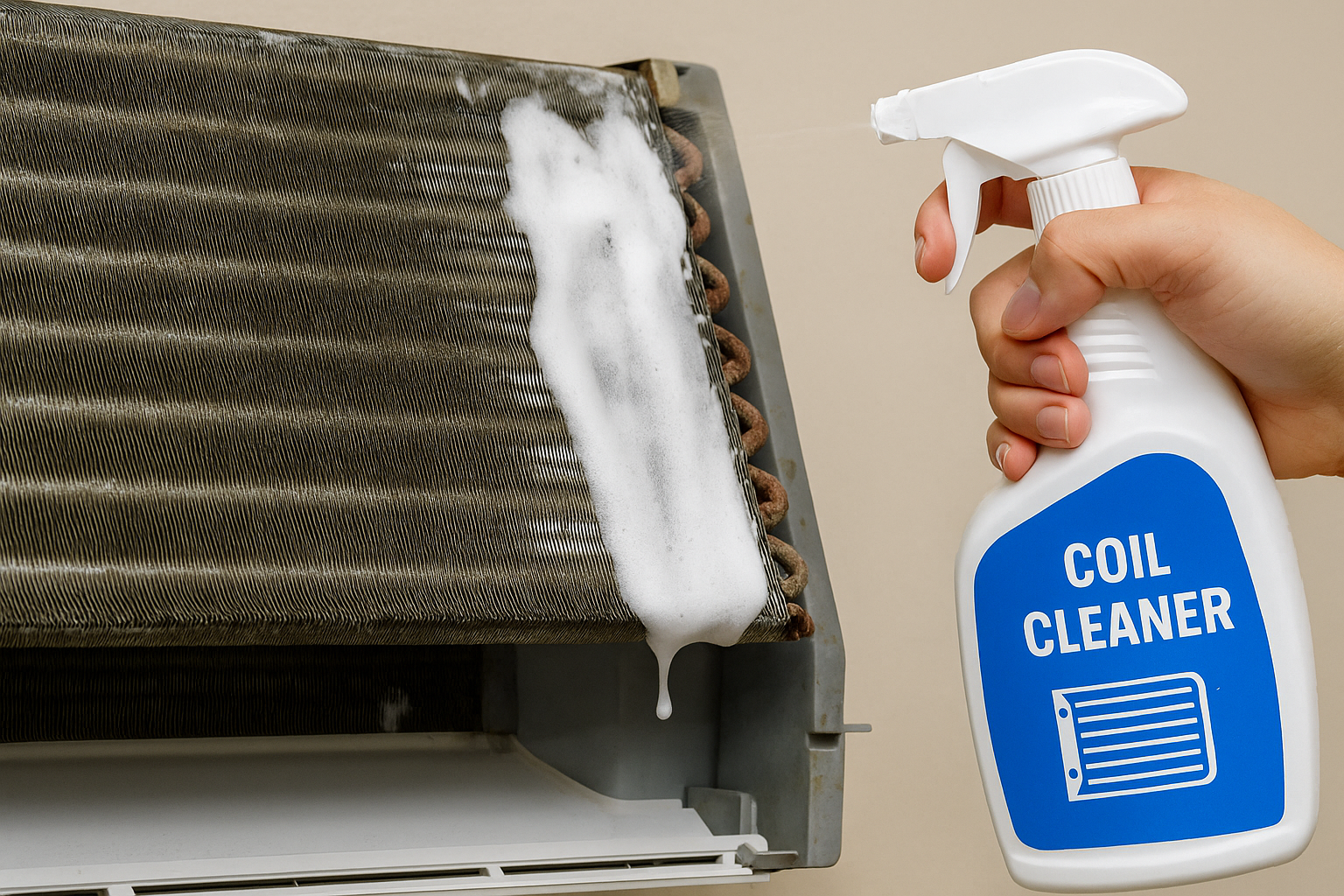When your air conditioner isn’t cooling or it’s making a strange sound, the problem could be dirty evaporator or condenser coils. These crucial parts of your AC system can become clogged with years of dust, mould, grime and debris, which can restrict airflow and reduce its efficiency. The solution? What chemical to use to clean ac coils.
No matter if you’re a trade qualified HVAC technician or right into your DIY here in Oz, in this guide we’ll cover:
Why you need to clean your AC coils
- How coil cleaners work
- Best types of chemicals to use
- Step-by-step cleaning tips
- Product recommendations in Australia
- Let’s make your system like new again.
🧪 What Does a Chemical Coil Cleaner Do?
A chemical coil cleaner is to for dissolving grime, grease, biological growth (such as mold or mildew) and other debris from metal coils. These cleaners can come in:
- Foaming sprays (so are good for deep cleaning)
- NO foam sprays (When used with sensitive systems)
- Liquid extracts (for dilution and large-scale use)
- Automatic Rinse OR Rinse Required
They’re designed to:
- Break down organic and inorganic contaminants
- Restore thermal conductivity
- Remove odours
- Prevent corrosion with protective coatings
🔍 What Is a Good Chemical to Clean Air Conditioner Coils?
Here’s what you’re looking for when you’re picking a coil cleaner:
✅ Compatibility
Check that it is safe to use on aluminium and copper, the main materials used in coil fins and tubing.
✅ Type of Coil
Select separate formulas for evaporator (indoor) and condenser (outdoor) coils. Outdoor coils are more tolerant of harsh cleaners.
✅ Foaming Action
Foaming cleaners foam up to penetrate deep into coil fins and pull gunk out effectively.
✅ Rinse Requirements
Some cleaners must be rinsed with water; others are no-rinse cleaners, which is best for indoor coils or inaccessible outdoor units.
✅ Environmentally Friendly
In Australia, cleaners must be biodegradable and non-acidic to comply with safety and environmental regulations.
🧼 What Kind of AC Cleaning Chemicals to Be Used?
1. Acid-Based Coil Cleaners (Hardly used anymore)
- Highly aggressive, Removes heavy scale.
- For Metal only, can damage painted or delicate surfaces
- Not recommended for home use
2. Alkaline Coil Cleaners
- Clients may also find it uses more for exterior condenser coils
- Able to cut through grease, oil, and grime
- Can be caustic if it's not rinsed well
- Always wear PPE
3. Neutral pH Coil Cleaners
- Safe for all coils; indoor and outdoor.
- Compatible for sensitive installations and DIY use
- Usually no-rinse, so they are easy
4. Foaming Coil Cleaners
- Expands Into coil fins for deep cleaning
- Usually a few minutes after applied.
- As with residential and commercial HVAC upkeep.
5. Spritz Evaporator Coil Cleaner (No Rinse)
- Perfect for indoor units
- Cleans as you run and leaves the moisture })
- Helps prevent mould regrowth
How Do You Use a Chemical Coil Cleaner – Step by Step
⚠️ Follow the safety directions on the label. Put on gloves, goggles and work in a well-ventilated area.
How To Clean Indoor Evaporator Coils (Only for Split Systems & Ducted Units)
You’ll need:
- No-rinse coil cleaner
- Soft brush or cloth
- PPE (gloves, goggles)
Steps:
- Switch power off to your AC.
- Open the access panel to reveal the evaporator coil.
- Brush off any loose debris.
- Liberally apply the no-rinse cleaner to the coil.
- Allow foam to expand and lift dirt (5-10 min).
- Close the unit, switch the system back on — it will rinse itself as it develops condensation
Outdoor Condenser Coils Cleaning
You’ll need:
- Foaming coil cleaner (either alkaline or neutral)
- Garden hose with spray nozzle
- PPE (necessary for alkaline cleaners)
Steps:
- Disconnect power and remove any radiation sources.
- Use brush or vacuum to remove debris such as leaves or dust.
- Uniformly spray the chemical on the coils.
- Allow 5–15 minutes according to package instructions.
- Fully rinsed from the inside out using a hose.
- Reassemble and power back on.
🛒 Recommended Items: Top Chemicals for Cleaning AC Coils Australia
1. SpeedClean AC-1G-CS6 1 Gal Coil Shot Coil Cleaner system With Wand And FlowSpinner Gun Included!
Ideal For: Heavy-duty condenser coil cleaning
Features:
- High foam alkali product.
- Biodegradable
- Requires rinsing
➡️ Buy it here
2. Air Conditioner (2) Coil Cleaner solution, Clean Ac evaporator with Professional Cleaning Brush 2 Pack w/ Sprayer
Perfect for: Cost-effective home use
Features:
- cludes sprayer attachment
- Non-acidic formula
- Great For all-weather indoor outdoor use
➡️ Buy it here
3. SAFETY:Honeywell Evaporator Cleaner can be used without any risk to your family.
Perfect for: Evaporator coils located indoors
Features:
- Self-rinsing
- Neutral pH
- Fresh fragrance eliminates odors
➡️ [Available via special order on request]
🧠 Frequent Questions About Coil Cleaning Chemicals
❓ How frequently do I need to clean AC coils?
Suggestions I see at least annually, and ideally before summer. However, where it is dusty or humid, 6 months is recommended.
❓Are household cleaners safe for my AC coils?
No Vinegar, bleach or soap can harm metal fins and insulation. Use chemicals and antifreeze that are HVAC approved.
❓ How often do you clean your coils?
It should be. A proper HVAC maintenance routine includes coil inspection and cleaning—especially before peak cooling season.
🧊 Effects Of Not Cleaning Ac Coils.
Potential Outcomes of Neglecting Coil Cleaning:
- Refrigerator coils are frozen, no longer cooling
- №Fix compressor resulting from over labor.
- Mould problems and bad indoor air quality
- A 20–40% jump in electricity demand
- Extreme catastrophes of the whole setup
🌿 Eco-Friendly Hacks for Cleaning AC Coils in Australia
With Australia’s stringent environmental standards here, follow these tips:
- Use biodegradable, non-acidic cleaners whenever possible.
- Collect and dispose of runoff water responsibly.
- Never clean coils near stormwater drains or natural waterways.
- Store chemicals in a cool, dry, and labelled container.
🔧 Real Story: Sam the DIY Dad from Brisbane
“I noticed my split system wasn’t cooling like it used to. I did a bit of Googling, picked up a spray foam coil cleaner from HVAC Shop, and gave it a go myself. The amount of grime that came out was shocking. But after that, the air felt cooler and the unit ran quieter. Honestly, I wish I’d known about this trick years ago.”
🛠️ Coil Cleaning = Long-Term Savings
Using the right chemical to clean AC coils not only keeps your air conditioner running smoothly—it can:
- Extend the life of your system by 5+ years
- Reduce repair bills
- Improve indoor air quality
- Save up to $200/year on electricity (for a standard home)
✅ Final Thoughts: Choose the Right Chemical and Clean Smart
A clean air conditioning system is an efficient, reliable, and healthy one. By using the correct chemical to clean AC coils, you’re protecting your investment and ensuring your comfort year-round.
Whether you're a pro tradie or a hands-on homeowner, the right coil cleaner makes all the difference. Choose a reputable product, follow the steps safely, and enjoy better performance and cooler air with every cycle.
🔗 Shop Trusted Coil Cleaners
Visit HVAC Shop Australia for a full range of:
- Coil cleaners (spray, foam, concentrate)
- Sprayer kits and accessories
- HVAC maintenance tools
We ship fast across Australia and provide local support to make every job easier.

